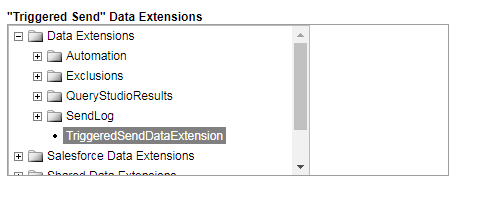Is there a way to have custom placeholder values when programmatically sending an email template using a triggered send through the SOAP API? I see in this documentation for personalization strings that you can include placeholder values like %%emailaddr%% that get populated with content when an email is sent.
Is there a way to specify other arbitrary placeholders like %%dog_breed%% when creating an email, and then including dog_breed as an attribute value or something when creating a triggered send with some passed in value? To clarify, this value might be something generated at the time when I want to trigger the email, and is not something you'd find stored in a database.
The only leads I've found were:
- The personalization strings mentioned earlier
- Data extensions as described here. However, this seems to refer to data you'd expect to find stored in tables, and so might not be the right approach due to fact that I want to generate values at the time of triggering the email, as mentioned above
- Something like the
HTMLAttributessection mentioned in this documentation.
(As a side note, I am not an account owner, and as they have no developer edition for the marketing cloud, I'm working slightly in the dark here.)

